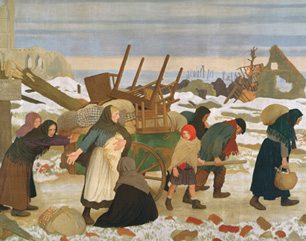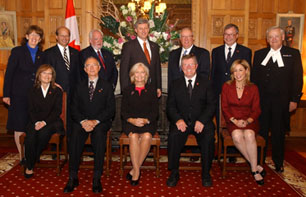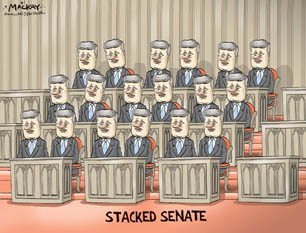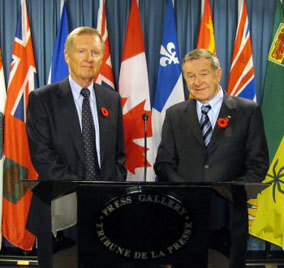More ironies of Canadian history – could Harper’s stacked Senate trigger an election at last?
Sep 24th, 2010 | By Randall White | Category: In Brief
One of “Eight magnificent paintings depicting different war scenes” that “have adorned the walls of the Senate Chamber since 1921” – perhaps to remind senators of how lucky they are to have been appointed to the Senate of Canada?
Ever since Canada definitively became An Actual Democracy in the early 20th century (at the very least), its unreformed, “relic-of-the-19th-century” Senate has generally refrained from trying to defeat legislation duly passed by a majority of the democratically elected Canadian House of Commons. A merely appointed Senate in an actual democracy that tried to actually exercise its theoretical powers would just precipitate its own abolition, at last.
(The Senate of Canada did reject Mackenzie King’s first Old Age Pensions Bill on May 28, 1926, just under a month before his minority government was defeated – leading to the so-called “King-Byng Affair” and the return of Mr. King to office, with at least a strengthened minority government, in the September 14, 1926 federal election. An identical Old Age Pensions Bill was subsequently “presented to the House and passed … on March 4, 1927.” And on “this second occasion” the Senate also “quickly passed the bill.”)

Nine of the unprecedented 34 new senators Stephen Harper has so far appointed to the unreformed Red Chamber, at the time of their swearing in, September 15, 2009.
In the wake of the elected Commons’ razor-thin rejection of Candice Hoeppner’s private member’s bill to scrap the long-gun registry, however, various media reports have raised the notion that, in 2010, some serious potential political power still lies within the “Red Chamber” of the still unreformed and unelected Senate, to which PM Harper’s recent unprecedented orgy of old-style raw patronage appointments has given what will soon become a Conservative majority.
Just yesterday in the Globe and Mail, eg, Gloria Galloway noted that federal NDP leader Jack Layton has said he will now “focus on bringing in legislation to resolve the differences of opinion expressed about the [long-gun] registry in the various parts of the country.” But “Mr. Layton would be the first to admit that the Conservatives hold de facto control of the Senate … and, as of November, will hold an outright majority of seats in the Red Chamber. That means any opposition efforts to change the registry would require the support of the government and Mr. Harper has shown no interest in such reform; he wants the registry gone.”

From the August 27, 2009 posting on the blog “Buckdog ... Fresh Winds From The Prairies,” entitled “Harper Names Nine New Tory Porkers To Senate.” The cartoon is by Graeme MacKay of the Hamilton Spectator. See below for a link to his website.
This past Wednesday, in the Toronto Star, Thomas Walkom was similarly writing about Liberal MP Gerard Kennedy’s private member’s bill to legalize the status of the “between 200 and 300 American deserters from” George W. Bush’s Iraq war who are still in effect hiding in Canada –Â as a result of what US filmmaker Michael Moore has recently blasted as Canada’s “shameful” current position “on US war dodgers.” Mr. Walkom noted that “Kennedy’s bill seems set to pass the crucial second reading hurdle next week with the support of the combined opposition.” But there could still be “more hurdles” after that, “particularly in the Senate.”
Yet anyone with even only a somewhat deep sense of the long history behind the Senate reform issue in Canada is still bound to wonder: Would the emerging new raw-patronage Conservative majority in the still unreformed and unelected Senate of Canada actually defeat even a private member’s bill duly passed by a clear majority of MPs in the elected Canadian House of Commons? And what would be the practical political consequences if it did – in the next Canadian federal election say?

Senators Bob Runciman (Ontario, l) and Bert Brown (Alberta, r) : Do these two self-declared Conservative Senate reformers believe that the unelected and unreformed Senate of Canada should actually be trying to defeat bills passed by clear majorities in the elected Canadian House of Commons?
Only a few months ago, eg, the Canadian Press was reporting: “The Tories are threatening a fall election after opposition senators stripped contentious provisions from the Harper government’s massive budget implementation bill … Senator Doug Finley, the Tory national campaign director, said a fall election is a distinct possibility if senators refuse to pass the bill as is.” Now this same kind of shoe, it would seem, will soon be on the other foot. And what would Bert Brown from Alberta and all the other Senate reformers be almost bound to say – in principle at any rate – if the new Conservative majority in the unreformed Senate starts thwarting the will of the duly elected opposition majority in the Canadian House of Commons?
It perhaps all goes to show that, while Canadian federal politics may be getting crazier and crazier – and further and further from the democratic majority of the Canadian people, coast to coast to coast, it does remain at least ironically entertaining. And that must be some kind of good thing?
The countertweights editors thank Graeme MacKay for his generous policy on the use of his editorial cartoons. CLICK HERE for more of his excellent material.


[…] This post was mentioned on Twitter by Martell Thornton, Counterweights . Counterweights said: More ironies of Canadian history — could Harper’s stacked Senate trigger an election at last? : http://bit.ly/aBZqW0 […]
http://topsy.com/www.counterweights.ca/2010/09/more-ironies-of-canadian-history-%E2%80%94-could-harper%E2%80%99s-stacked-senate-trigger-an-election-at-last/?utm_source=pingback&utm_campaign=L2